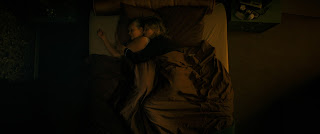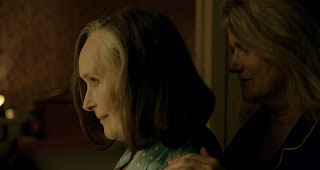François Ozon is nothing if not prolific, and Peter von Kant, which screens today at the London Film Festival, marks his 21st feature film; an impressive tally, given that his first full-length effort, the singularly unpleasant Sitcom, was released a mere 24 years ago. Ozon's next feature but one after Sitcom, Water Drops on Burning Rocks, was an adaptation of a work by Rainer Werner Fassbinder—a filmmaker who cranked out films at a rate that makes even Ozon look like a slouch. For his latest feature, Ozon again looks to Fassbinder, whose 1972 film The Bitter Tears of Petra von Kant is given a makeover in which the title character, as evidenced by the slight tweak to their name, is now male. Fassbinder's film was an all-female affair, and although Ozon doesn't go as far as to completely invert this setup, his take on the story primarily focuses on male characters.
It appears that much of the reasoning behind this bold decision is so that Petra can be conflated with Fassbinder, with the resulting Peter played by the superb Denis Ménochet. Ménochet has given many fine performances in recent years, including his turns in both Custody and Ozon's outstanding By the Grace of God. He appears to be having a great deal of fun as the main character in Peter von Kant, who is a monstrous, cruel and self-centred filmmaker ostensibly intent on turning Amir (Khalil Gharbia) into a movie star—although it is quite clear that his interest in this young man is more personal than professional. A mainly silent witness to the drama that unfolds between Peter and Amir is present in the form of the director's factotum, Karl (Stefan Crepon), who observes the histrionics in a calm, detached manner while attending to the whims of his waspish boss.
Peter, Karl and Amir are counterbalanced by three female characters, all of whom are related to Peter: his cousin Sidonie (Isabelle Adjani), his daughter Gabrielle (Aminthe Audiard), and his mother Rosemarie (Hanna Schygulla). All three have an impact on the increasingly drink-addled filmmaker, who appears to have no line of demarcation between his work and home lives. That said, virtually the entire film sees Peter camped out in his apartment, which is perhaps to be expected when you consider that the film(s), like Water Drops on Burning Rocks, started out life as a Fassbinder stage play. But Ozon is too savvy a filmmaker to allow Peter von Kant to carry the air of a filmed theatrical performance; rather, in what might appear to be a counter-intuitive move, he leans into the artifice, in the process creating a compelling, claustrophobic work, one that replaces both the staginess and iciness of Fassbinder's film with the keen sense of mischief prevalent in many (but not all) of Ozon's previous works.
In a film which is about, inter alia, blurred boundaries, Ozon gets considerable mileage from the slippery relationship that exists between his film and Fassbinder's, even going so far as to cast one of the original film's stars—Fass regular Schygulla—in a supporting role. It is difficult to work out if Peter von Kant is a remake, companion piece, reboot, homage, or palimpsest, and in some ways its unusual connection to its source material puts it in the same sphere as both Luca Guadagnino's Suspiria—a film that also cast a Fassbinder favourite (Ingrid Caven) in a small part—and Jerzy Skolimowski's EO, the latter of which also plays at this year's LFF; in a move that parallels Peter von Kant's use of Adjani, Skolimowski's film also features a member of French acting royalty, Isabelle Huppert, in an extended cameo. Regardless of your level of familiarity with Rainer Werner Fassbinder and/or The Bitter Tears of Petra von Kant, there is a great deal to enjoy in the taut, spiky Peter von Kant, which runs to a crisp 85 minutes. François Ozon's ability to change style from one film to the next is really quite remarkable; fortunately, given his track record, we shouldn't have to wait too long to see what he does next.
Darren Arnold
Images: BFI













